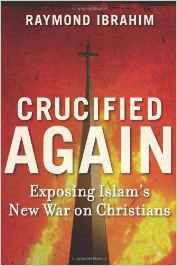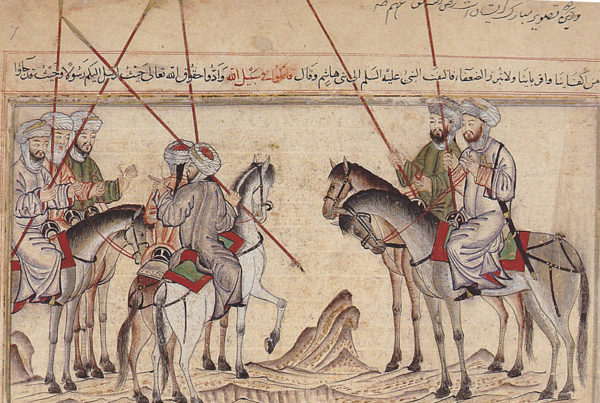 Raymond Ibrahim has written a powerful book, Crucified Again – Exposing Islam’s New War on Christians, at a time when the persecution of Christians is happening at a frightening rate but is not discussed in too much detail by either mainstream media or political pundits.
Raymond Ibrahim has written a powerful book, Crucified Again – Exposing Islam’s New War on Christians, at a time when the persecution of Christians is happening at a frightening rate but is not discussed in too much detail by either mainstream media or political pundits.
For me the book made more sense read backwards from end to beginning. In the second part of the book Ibrahim uses meticulous detail to go through every country where Christians are persecuted with references, statistics and real stories so he takes us through the horror of Christian lives today.
Also later in the book, Ibrahim highlights some of the reasons of Christian persecution as Apostasy and Blasphemy laws which is correct.
This part of the book is well documented and researched.
However the first part of his book does not show the same meticulous objective research. Ibrahim has received rave reviews for this book, but not a single review by a Muslim scholar. That is telling.
In part one of the book titled “lost History” Ibrahim defines sharia as the “Islamic Way of doing things”. He makes a generalized statement that “whenever and wherever Muslims are in power or getting more power, churches are outlawed, burned and bombed….” This does not hold true for many countries where until recently Christians lived peacefully. To the point, I grew up in Pakistan where Christians thrived until recently. I studied in a Convent school and college set up by Catholic nuns where Churches were part of the school. These were scattered all over Pakistan. It’s only in the past three decades, when Wahabbism became the religious doctrine of Pakistan, that Christians started being persecuted.
Even in early Islamic History there is a precedent for respect for Christians. In 637 when the Caliph Omar conquered Jerusalem, he came to the Church of The Holy Sepulchre at a time for prayer and asked the Patriarch for a space where he could pray. The Patriarch told him that since he was now the ruler, he could pray anywhere in the Church. But Omar refused saying that if he did that, his followers might erect a mosque in that spot which would not be correct. So he went out and prayed across the street where today stands The Mosque of Omar.
This is not to say that throughout Islamic History there have been times when Christians were persecuted in the same manner as during wars, Christians have persecuted others. Ibrahim’s critique of the history of Muslims, the Caliphate and its followers is on the spot and I will not argue with it.
My biggest concern is Ibrahim’s explanation that Christian persecution is sanctioned by the Koran. At the onset of this chapter, Ibrahim clearly indicates that anyone citing Koranic verses that speak of respect for Christians is an apologist.
At the risk of being labelled one, I will argue that Ibrahim’s assessment is incorrect. The book cover tells us that Ibrahim is a Coptic Christian, born and raised in America by Egyptian parents. As an Arabic speaker he should know that Arabic words can be interpreted to mean different things in different contexts. However he has not mentioned this anywhere in the book. It was important to note this when he says on page 1, “the patterns of persecution of Christians are drawn from themes in the Koran”. Here ‘themes’ means verses taken out of context both by Muslims and non-Muslims.
Ibrahim begins his chapter on the Koran by citing two verses in chapter 5 which begin with the word ‘Infidel’. Ibrahim defines ‘Infidel’ to mean those who are not Muslim. In actual fact that is what the word infidel means today, but in the Koran (if read in context of history) ‘Infidel’ refers to idol worshippers and those who do not believe in God. The ‘enemy of Islam’ that he refers to later was a situation in which either the Muslims killed or got killed – it was tribal warfare but the sanction to go to war comes with many caveats in the Koran for not harming women and children, for not harming places of worship and a very clear indication that when the other party makes peace, so do the Muslims. Chapter 2 verse 185 “And fight in the way of God with those who fight with you, but aggress not; God loves not the aggressors”. (The Koran interpreted by A.J. Arberry)
This is the point where it would have made sense for Ibrahim to mention that Jesus is mentioned more times by name in the Koran, than Mohammad and that an entire chapter (19) in the Koran is dedicated to the birth of Jesus. Ibrahim mentions this only in the context that Muslims do not accept the concept of Trinity which is correct and this is mentioned in the Koran as guidance, not as an act of aggression. He also fails to mention that time and again the Koran refers to “people of the book” which includes Christians. In fact a large part of the Koran consists of stories of the Jews and Christians.
Ibrahim mentions Mohammad as a warrior which is also incorrect. Reference can be made to Mohammad’s biographies written by non-Muslims. The first person that Mohammad went to when he received revelation was a Christian Monk.
Ibrahim is to be lauded for bringing this burning issue of Christian persecution to the attention of the world but it would have been better read and balanced if there was mention of a political ideology (Radical Islam) gone mad.








